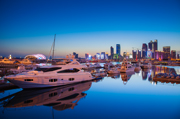City of sails
( 中国日报 )
Updated: 2011-08-29
|
|||||||||

A sailing competition is held in Qingdao, Shandong province, in May. Chinese interest in the sport has grown following the 2008 Olympics and the Qingdao government plans to build the city into the "Chinese City of Sails". Photos by Cui Meng / China Daily
As sailing attracts increasing attention, the number of Chinese people engaging in the sport is on the rise
Sailing is an all-consuming passion for the real enthusiast, such as Arpad Senti, the former Austrian Olympic trainer from Vienna. Now the 50-year-old is teaching beginners in Qingdao, one of East China's most beautiful coastal cities. "There's a big difference between Olympians and beginners, but I've never regretted my decision," he says. Senti praises and encourages his students even when they only make a slight improvement, one that would not be worth mentioning to a professional sailor.
When the summer sailing camps are in full swing, Senti holds classes all day, with more than 20 students attending each 4-hour training session.
"I enjoy living in Qingdao and promoting one of the most exciting sports in the world," he says, having moved to the city not only because he married a Chinese woman, but also because he saw business opportunities in the up-and-coming sailing center.
Senti opened the city's first sailing shop and ran a sailing club for three years up until the end of 2008. However, the Olympic sailing events did not bring the host city a much-improved market. More people were aware of the sport, but that interest was still not great enough to support Senti's business in those days.

Having spent a year in Europe, he returned to Qingdao in 2010 because he realized that the situation had improved. "Now, with more international sailing competitions happening in Qingdao and all the work done by the local government, I have more confidence," Senti says.
As one of China's most famous coastal cities, Qingdao has a long history of boat building, with more than 10 shipyards established since the 1950s.
However, the production of sailing boats was non-existent until the Olympic Games, which not only brought a sailing culture to the city, but also more business related to the industry.
Since the early 2000s, many local boat companies have started making sailing boats and yachts in the city and there are currently more than 50 companies producing more than 10,000 sailing and yachts a year, with about 90 percent of their products sold overseas. One of those companies, Qingdao Nauticstar Marine Co Ltd, is the local industry leader.
"We are lucky to set up our business in Qingdao at the start of a golden age in the city," says Hou Jie, the general manger of the company.

Nauticstar, established in early 2002, started with a variety of businesses, including automobile design, light aircraft and yachts. As Qingdao prepared to host the Olympic sailing events, the local government contacted Nauticstar and asked the company to provide the support vessels for the competition.
"The International sailing events in Qingdao provided us with many business opportunities, and we had a chance to realize many of our design and product ideas," Hou says.
There are more than 150 employees, including 13 foreign designers, 11 different research teams and 60 groups working for Nauticstar, which has been covering almost all of the domestic and international sailing competitions in the city. It also successfully bid for some of the support vessel projects for the 2012 London Olympics.
With many companies competing in the lower-end market, Nauticstar instead focused on improving its designs and the quality of its products.
"We target the high-end and the international market," says Hou.
Once it had become established in the domestic market, Nauticstar started reaching out to the global market by purchasing international brands. Currently, the company is in contact with a leading European sailing company and is considering an overseas listing later this year.
"By buying foreign companies, we can utilize their advanced knowledge and skills to train our designers and workers."
Participating in international exhibitions is another effective way to expand in the international market. Every year Nauticstar attends at least three major exhibitions in Europe, especially in Mediterranean countries.
While encouraging local companies to expand in the international market, the Qingdao government is also planning to establish a sailing and yachting industrial park by 2015, and hopes to use the value added by the sailing and yachting industry to earn 10 billion yuan (1.07 billion euros) by 2012. It also plans to build Qingdao into the Chinese "City of Sails", by using all the resources from the 2008 Olympics.
The venues for the 2008 regatta are well maintained and have become a local landmark and an important aid in the development of sailing events, especially as the world's first "Olympic Sailing City" museum was established at the venues.
After five years' promotion, Qingdao now has 28 professional sailing clubs, more than 2,000 licensed sailors and many student-training programs serving 165 local schools. About 5,000 students have been trained to sail so far.
The local government raised 8.68 million yuan in 2007 and bought about 1,000 sailing ships for the local schools.
Education in sailing has become a part of the physical education system and a selection system for student training has been set up.
"No students wanted to be trained as sailors five years ago, but now more parents are sending their children to the training camps," says Lin Zhiwei, chairwoman of the Qingdao branch of the Chinese National Sports Association and chairwoman of the Qingdao Sailing Association.
In the past five years, more than 100,000 local residents have sailed and the local government will continue to promote the sport in their daily lives. "I am sure that figure will increase," says Xia Geng, the major of Qingdao. "We are looking for 300,000 residents to engage in the sport by 2014."
The city has hosted a number of international sailing competitions and events. The first "Qingdao International Sailing Week" was held in 2009, deliberately referencing the famous "Kiel Week" competition, which is held annually in Germany. More than 200 celebrities from the sailing world came to the city for the competition, which was a feather in the cap for the event's organizers.
"A lot of people questioned the decision to hold such a high level international sailing event at the beginning," says Lin, "but the good relationship we retained with the International Sailing Federation from 2008 Olympic Sailing Games was the key to our success." Meanwhile, the first "Olympic Sailing City Mayor &International Sailing Summit Forum" was also successfully held in 2010.
The Sailing Week in August is also likely to attract more sailing experts to the city, and in addition to participating in conferences, they will be invited to take part in a competition called "Celebrity Challenge".
About 20 people including some champions, sailing company CEOs and chairmen of sailing associations in other countries will be invited. All 10 boats used in the event will be produced in China.
"We intend to keep the celebrity events in our sailing weeks, which attract a lot of attention," Lin says.
The Extreme Sailing Series, which is one of the top international professional sailing events, was held in Qingdao in April, and other professional events such as the Clipper Round the World Race will also come to the city in August.
"To improve the sailing culture, we still need to host more top competition, then we'll be able to see the difference in skill between professional and amateur sailors," says Qu Chun, vice-president of Qingdao's Yachting Association.
The association is working on building up a Chinese training and certification system, modeled on the evaluation systems in the United States and Europe. Due to the lack of an internationally recognized licensed program in China, Chinese sailors have to train overseas at very high cost.
"When we set up our certification system, the cost of training sailors could be cut by around a half, and that will make the sport more convenient for the public," Qu says.




